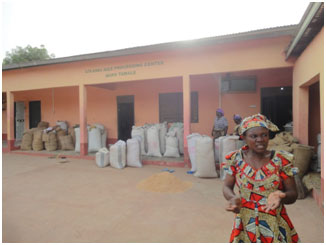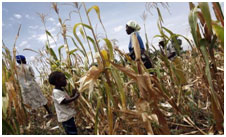
Ghana Agricultural Sector Budget Support 2009-2013
Context
 Following the Paris Declaration in 2005, the 2008 Accra Agenda and broad implementation of Managing for Development Results (MfDR) concepts, developing countries and development partners (DPs) are moving their cooperation from investment projects to budget support. Budget support as a share of official Development Aid (ODA) has thus increased in most developing countries. This is particularly true for the case of Ghana. The Canadian International Development Agency (CIDA) was one of the first partners to provide budget support to the agricultural sector of Ghana starting in 2004. CIDA’s financial support has averaged $20 million per year between 2004 and 2011.
Following the Paris Declaration in 2005, the 2008 Accra Agenda and broad implementation of Managing for Development Results (MfDR) concepts, developing countries and development partners (DPs) are moving their cooperation from investment projects to budget support. Budget support as a share of official Development Aid (ODA) has thus increased in most developing countries. This is particularly true for the case of Ghana. The Canadian International Development Agency (CIDA) was one of the first partners to provide budget support to the agricultural sector of Ghana starting in 2004. CIDA’s financial support has averaged $20 million per year between 2004 and 2011.
The first budget support ($85 million) covered the period 2004-08 followed by $20 million in a bridging year. The second budget support, totals $110 million, is currently being implemented and covers 2009-13. As with all budget support initiatives, CIDA is working in close cooperation with other donors and the Government of Ghana (GoG) to strengthen aid effectiveness. Given its substantial investment in the agricultural sector, CIDA wanted to assess its current and past support to the Ministry of Food and Agriculture (MoFA). This was the main purpose of this project.
Objectives

At the mid-term of its second budget support, CIDA would like to assess the efficacy and efficiency of this support and learn ways to improve this and future ones. The main objective of this assignment was to evaluate the results, the effectiveness and efficiency of budget supports to date while providing guidance on how to more effectively implement budget support programs with MoFA.
The specific objectives are to:
- Assess sector-specific results achieved;
- Evaluate the implementation of budget support programs
- Assess the Institutional development results
- Assess the effectiveness of budget support programs
- Identify lessons learned during the process of implementing budget support to MoFA since it began in 2004
- Provide key recommendations to improve implementation of budget support programs for the remaining two years of sector budget support, for both institutions
- Provide recommendations for future large-scale support to Ghana’s food and agricultural sector.
Services provided by CESS
- Desk review of the Budget Support;
- Field visit in Ghana (Accra and Tamale);
- Meeting with the main stakeholders (CIDA, MoFA, beneficiaries population);
- Assessment of the budget support.
Resultsachieved
 Évaluer les résultats sectoriels atteints;
Évaluer les résultats sectoriels atteints;- Assessment of results, effectiveness and efficiency of budget supports of CIDA to MoFA;
- Design of recommendations for future large-scale support to Ghana’s food and agricultural sector provided
- Recommendations to improve implementation of budget support programs for the remaining two years of sector budget support, for both institutions.



